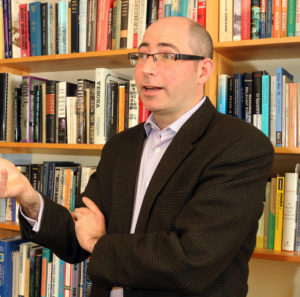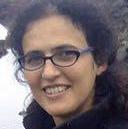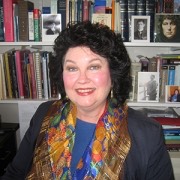UPDATE: This production has been cancelled due to recent advances with the COVID-19 Outbreak. Please see “Important Update About Pipeline” for more information.
Join us on Saturday, April 18 at 7:00pm for a pre-show conversation with David Unger and Dick Rubenstein.
Historian of Science David Unger talks about the significance of the collaboration between Ada Lovelace and Charles Babbage, and Computer Scientist Dick Rubenstein—who built a theatrical replica of Charles Babbage’s model of the Difference Engine —offers his insider perspective on the mechanics of what they imagined.
Dick Rubinstein works in a variety of technical areas in the theater, including props, set design and construction, lighting, and sound design. He’s delighted to return to Central Square Theater, where last he consulted on Breaking the Code, another play that focuses on people in the history of science and technology. Dick likes to make and fix things, and has a workspace at the Artisan’s Asylum, a maker space in Somerville. His degrees are in engineering and social science, a combination that led to a career in human factors and user experience. That’s not so different from designing sets and props: whatever the technology on the inside, how should the outside be designed to connect with the people who interact with it?
David Unger is the Director of Administration at Harvard University’s Collection of Historical Scientific Instruments and a lecturer on the History of Science. David wrote and produced “Restless Device: A Podcast About Extraordinary Technology” from 2015-2017 which explored past and present technologies and what they can tell us about large questions.


 Adriana Craciun specializes in eighteenth and nineteenth-century British literature and culture, with current research in Arctic humanities, exploration studies, science studies, historical geography, history of collecting, Enlightenment, history of the book and of authorship. Her most recent book, Writing Arctic Disaster: Authorship and Exploration (Cambridge UP, 2016), was shortlisted for the 2016 Kendrick Book Prize by the Society for Literature, Science & the Arts, and uncovers a rich textual and material archive of Arctic exploration culture from the 17th century through to our own era of renewed interest in exploration’s contentious legacies. She is also the author of Fatal Women of Romanticism (Cambridge UP, 2003) and British Women Writers and the French Revolution: Citizens of the World (Palgrave, 2005), which focused on women writers’ significant contributions to Romantic-era thinking on the body, gender, revolutionary politics, and cosmopolitanism. She also runs the Cultures of Science interdisciplinary research seminar at BU, and serves on the Executive Board of the Center for the Study of Europe, and as Associated Faculty at the Pardee Center for the Study of the Longer-Range Future.
Adriana Craciun specializes in eighteenth and nineteenth-century British literature and culture, with current research in Arctic humanities, exploration studies, science studies, historical geography, history of collecting, Enlightenment, history of the book and of authorship. Her most recent book, Writing Arctic Disaster: Authorship and Exploration (Cambridge UP, 2016), was shortlisted for the 2016 Kendrick Book Prize by the Society for Literature, Science & the Arts, and uncovers a rich textual and material archive of Arctic exploration culture from the 17th century through to our own era of renewed interest in exploration’s contentious legacies. She is also the author of Fatal Women of Romanticism (Cambridge UP, 2003) and British Women Writers and the French Revolution: Citizens of the World (Palgrave, 2005), which focused on women writers’ significant contributions to Romantic-era thinking on the body, gender, revolutionary politics, and cosmopolitanism. She also runs the Cultures of Science interdisciplinary research seminar at BU, and serves on the Executive Board of the Center for the Study of Europe, and as Associated Faculty at the Pardee Center for the Study of the Longer-Range Future. Sue Weaver Schopf discusses Ada’s upbringing by Lady Byron—in light of her disastrous marriage to poet Lord Byron—and the opposing views Ada had of her father.
Sue Weaver Schopf discusses Ada’s upbringing by Lady Byron—in light of her disastrous marriage to poet Lord Byron—and the opposing views Ada had of her father.